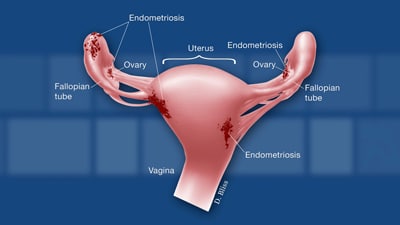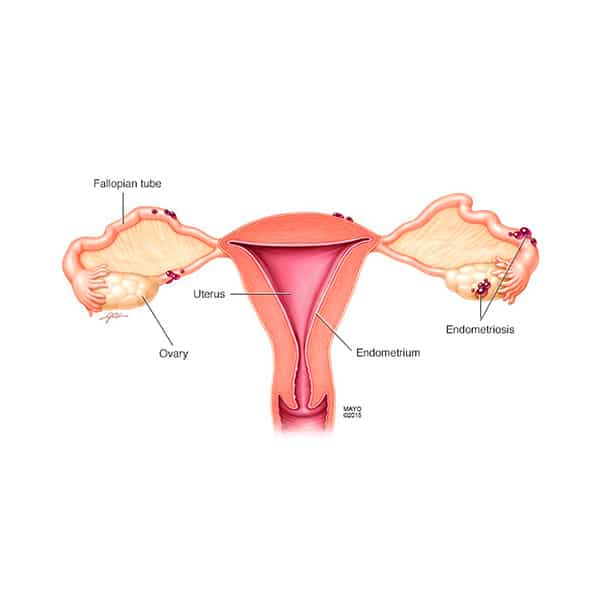
What are the symptoms of Endometriosis?
- Constipation
- Bloating
- Fatigue
- Painful bowel movements
- Painful intercourse usually with deep insertion or certain positions
- Infertility
- Right and/or Left sided pelvic and abdominal pain
- Diarrhea
- Pelvic pain during menses, before menses, after menses and/or anytime during the month
- Urinary frequency, and/or urgency, and/or painful voiding
- Malaise
- Lower back pain
- Heavy or irregular periods
The symptoms of endometriosis are related to the areas where endometriosis invades. Endometriosis of the uterosacral ligaments/cul-de-sac leads to painful intercourse, constipation, diarrhea and painful defecation. Endometriosis on the ovary can lead to left sided or right sided pain. Bladder endometriosis may lead to urinary frequency or urgency. You may have only one of the above symptoms or many. Even one symptom can be suggestive of Endometriosis.
Some women have no symptoms yet suffer from infertility. And many women do not have any symptoms, but discover they have endometriosis when are having trouble conceiving. If your doctor told you that you have ‘unexplained infertility’, endometriosis is the culprit in 40-50% of cases of unexplained infertility. If you need an endometriosis specialist in Fort Myers, Naples or Cape Coral, make an appointment with Dr. Bloy. His excision and medical treatment of endometriosis decreases inflammation, pain and will improve fertility.
What causes endometriosis?
Despite many hypotheses as to the causes of endometriosis, none of them have been definitively proven There is no full explanation of disease development. It seems to be multifactorial, involving:
- Retrograde menstruation
- Lymphatic and hematogenous spread
- Genetic predisposition and abnormal gene expression
- Environmental factors
- Immune system dysfunction.
Endometriosis implants are affected by monthly fluctuations of female sex hormones, can bleed, implant
elsewhere, and cause scar tissue and adhesions in an ongoing cycle.
Endometriosis in Teens and Adolescents
Endometriosis is common in adolescents, especially in those who have a history of painful periods and pelvic pain. This pain can be cyclical or non-cyclical. Other symptoms include painful bowel movements, constipation, intestinal cramps, and bladder pain. Sexually active adolescents may report pain during sex. Adolescents are regularly found to have early, superficial endometriosis. Articles suggest that in up to 70% of adolescents who do not respond to medical treatment for painful periods, endometriosis is discovered at the time of laparoscopy.
Most frequently, endometriosis symptoms do not improve with nonsteroidal anti-inflammatory (NSAIDs) and/or the birth control pill. Therefore, endometriosis may be progressing while just the symptoms are treated.
The laparoscopic findings of endometriosis in adolescents or teenagers can be different than in an adult. Endometrial lesions in teens or adolescents tend to be clear or red. A camera with 3-D HD magnification allows for better viewing of these clear and red lesions. Clear and precise visualization of these early lesions allows for superior surgical excision and a more successful outcome.
Dr. Bloy offers support and compassion in dealing with adolescents. Dr. Bloy has three daughters and relates well to adolescents. He is the medical director of experienced female nurse practitioners able to comfortably examine teen patients and begin the process of treating teens who are experiencing pain and are suspected to have endometriosis.
Endometriosis and Infertility
As much as 40% of unexplained infertility may be due to endometriosis. For some women, infertility may be the only symptom of endometriosis. In others, one or more of the following endometriosis symptoms may be present: painful periods, constipation, diarrhea, painful bowel movements, back pain, painful sex, abdominal pain, pelvic pain, bloating, urinary frequency, or painful urination. ‘Silent Endometriosis’ refers to women who suffer from infertility but are completely asymptomatic from endometriosis symptoms.
Infertility from endometriosis occurs due to inflammation and/or structural anatomical scaring/adhesions in the reproductive organs. Endometriosis is an inflammatory disorder that interferes with the process of the egg and sperm meeting, or implantation in the uterine lining. Endometriosis can also cause structural alterations to the pelvic organs—such as blocking the fallopian tubes or dilating fallopian tubes which cause infertility. Endometriosis can affect ovarian reserve and can lead to diminished egg quality.
Thankfully, excision of endometriosis and post-operative medical therapy often improves fertility by decreasing inflammation and can restore the proper structural foundations for fertility. Women often get pregnant after excision of endometriosis and may not require IVF. Please call today and schedule an appointment to learn how Dr Bloy can improve your fertility by treating your Endometriosis.
Dr. Richard Bloy specializes in the Treatment of Endometriosis and is the Medical Director of the Contemporary Health Center in Fort Myers, Naples and Cape Coral. Dr. Bloy has decades of expertise in identifying and treating endometriosis, and Laparoscopic and Laparoscopic Surgery.
Dr. Bloy specializes in pelvic pain and the treatment of endometriosis. He understands that endometriosis is a major reason woman experience pain. He strives to assess for all additional co-existing generators of pain in order to help women live pain free productive lives.
His training, with experts in the field of advanced laparoscopic surgery — allows Dr. Bloy to be one of a handful of physicians across the country trained to perform advanced minimally invasive procedures. Dr. Bloy provides both compassionate and individualized care while performing advanced laparoscopic techniques. Dr. Bloy operates in Lee Health System at Gulf Coast Hospital in Fort Myers, Florida. Dr. Bloy is board certified in OB/GYN. Dr. Bloy offers focused, individualized care with compassion.
